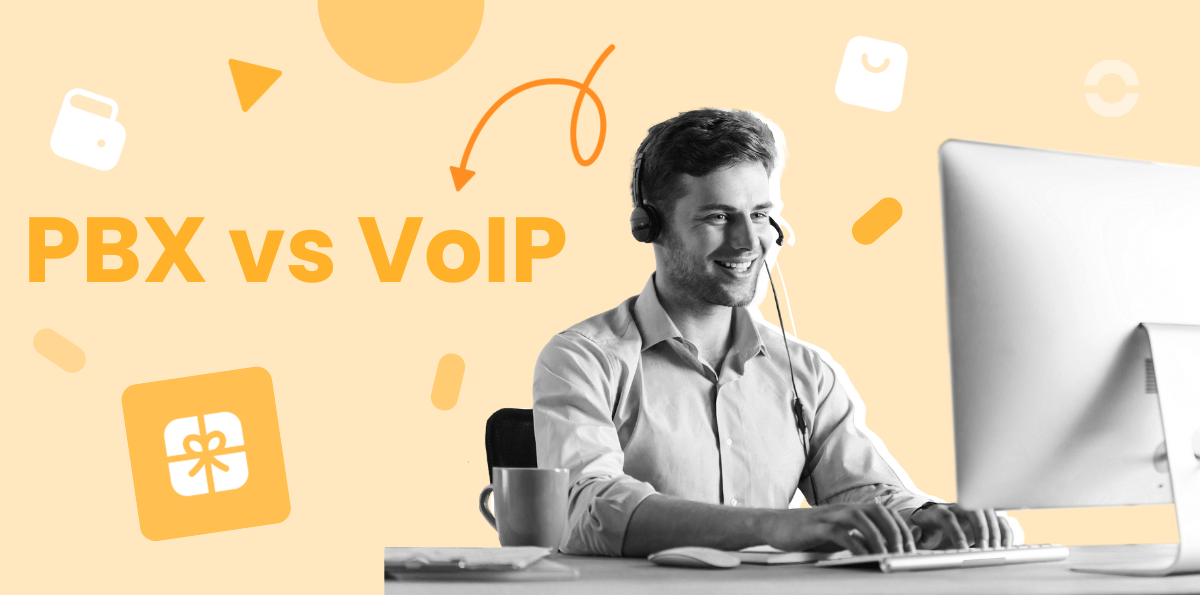In this article, we'll analyze the differences between a private branch exchange (PBX) and the communication system based on VoIP telephony. VoIP telephony (Voice over Internet Protocol). We'll take a close look at the features, advantages, and disadvantages of each technology, so that you can make an informed decision on which is the best option for your company.
Try a VoIP system for free
Both the PBX systems as well as cloud PBX with VoIP technology have their own strengths and limitations. We'll discover how they work, what makes them unique and what benefits they offer in terms of cost, flexibility, scalability and additional features.
Read on to discover the differences between PBX vs VoIP and find the best solution for your business communications!
Differences between PBX vs VoIP
Let's start with the basics: What's the difference between PBX and VoIP? PBX (Private Branch Exchange) and VoIP (Voice over Internet Protocol) are two communication technologies commonly used in businesses, but they have pretty major differences when it comes to how they work and the features that they offer.
PBX is a traditional telephone system that relies on local, physical hardware. It uses cabled telephone lines to route calls and manage internal and external telephony functions. PBX can offer features such as call forwarding, conference calls, voicemail, and more. However, it usually requires an initial investment in hardware and may entail additional maintenance costs.
Then there's VoIP, which is a technology that enables voice transmission over the Internet instead of using traditional telephone lines. It works by converting call audio into data packets that are transmitted over the IP network.
By using VoIP, phone calls can be made from devices connected to the Internet, softphones, such as smartphones, computers or IP phones. VoIP also allows for integration with other communication applications, such as email and instant messaging.
Let's look at the main differences between a PBX system and a VoIP system:
- Infrastructure: While PBX requires physical hardware, such as PBXs and phone lines, VoIP uses cloud-based services and internet-connected devices.
- Costs: PBX may require an initial investment in hardware and may entail additional maintenance costs. As for VoIP, it offers a more economical option, as no extensive infrastructure is required and call costs are usually lower.
- Scalability: PBX can be less flexible in terms of scalability, as additional lines and physical hardware must be added to increase capacity. On the flipside, VoIP technology is highly scalable and makes it simple to add or remove users.
- Mobility: VoIP offers greater mobility, as calls can be made from various devices connected to the Internet, making remote working easier. The traditional PBX is usually limited to landline telephones in offices.
- Additional features: Although the PBX can offer a wide range of features, VoIP tends to be more flexible and can be integrated with other communication applications such as email, instant messaging, and video conferencing.
To sum it up, contrary to popular belief, PBX and VoIP are communication technologies with significant differences. While PBX uses physical hardware and traditional telephone lines, VoIP is based on voice transmission over the Internet. VoIP offers a more economical, scalable, and flexible solution, with additional features and greater mobility.
Bear in mind that the choice between a PBX system and a VoIP system will depend on your company's specific needs and priorities. You should carefully weigh up the advantages and disadvantages of each system and consider factors such as budget, existing infrastructure and your company's long-term communication needs.
What is a virtual PBX?
A virtual PBX or VoIP PBX is a cloud-based business telephony system that uses VoIP technology to route and manage calls more efficiently. Unlike traditional PBXs that require local hardware and landline phone connectivity, a virtual PBX is a cloud-hosted service that is managed and controlled over the Internet.
Some of the advantages offered by a virtual PBX include reduced hardware and maintenance costs, the flexibility to add or remove lines as needed, and greater mobility to facilitate remote working.
Advantages of the PBX system 🟩
- Reliable technology: The traditional PBX has been used for a long time and is a reliable technology that has been tested and widely used in businesses around the world.
- Call quality: PBX systems usually offer better call quality because they use physical telephone lines.
- Security: PBX systems are usually more secure because they are hosted on the company's premises and are not exposed to possible cyber-attacks or security problems related to the Internet connection.
- Total control: By having the PBX physically installed in the company, users have total control over the management and configuration of the telephone system.
Disadvantages of the PBX system 🟥
- Implementation and maintenance costs: The installation of a PBX system may require a considerable initial investment in hardware and equipment, as well as additional costs for maintenance and upgrades.
- Lack of flexibility: Traditional PBX systems can be less flexible in terms of adding or removing phone lines, which can be a challenge if the company needs to adjust its phone capacity quickly.
What is a VoIP system?
A VoIP system is a telephony system that allows voice calls to be made and received over the Internet. In other words, it's a technology that enables the transmission of voice and data over an Internet connection. In essence, voice is converted into data packets that are transported via the Internet protocol. VoIP technology is also known as IP telephony.
Advantages of the VoIP system 🟩
- Reduced costs: VoIP systems generally have lower costs compared to traditional PBX systems. No expensive hardware infrastructure is required and phone calls are usually cheaper, especially for international calls.
- Flexibility and scalability: VoIP systems are highly scalable and flexible. You can add or remove lines and features as your business needs change. Plus, you can access your phone system from anywhere with an Internet connection.
- Integration with other applications: VoIP systems can be easily integrated with other communication applications, such as email, instant messaging, and video conferencing, allowing you to have a more complete and efficient communication solution.
- Mobility: With VoIP, you can make and receive calls from any device connected to the Internet, giving you greater mobility and the ability to work from anywhere.
Disadvantages of the VoIP system 🟥
- Internet connection dependency: The quality of VoIP calls is influenced by the quality of your internet connection. This means that if you have a slow or unreliable connection, you may experience call quality issues.
- Vulnerability to cyber-attacks: As an Internet-based system, VoIP systems are exposed to possible cyber-attacks and security threats. It's important to implement adequate security measures to protect the integrity of communications.
If your company needs a quality switchboard, the best option is the solution of omnichannel communication from Ringover. It's a VoIP PBX platform that features a complete call center software with advanced functions such as call recording, call forwarding, SMS for business, IVR customizable and integrations with CRM tools, to name but a few. A solution capable of improving your profits and optimizing all the processes of your sales and support teams, boost your business thanks to successful communication!
FAQs
What is a VoIP PBX?
A VoIP PBX, also known as a Private Branch Exchange or IP PBX, is an IP telephony PBX, also known as a Private Branch Exchange. telephony is a communication system used in business environments to manage telephone calls and other features related to the organization's internal and external communications.
In a traditional PBX, the fixed telephone lines, which are also known as landlines, are connected through specific, specialist hardware, such as a routing console, and the connections are cabled, creating a physical voice network independent of the company's data network. This type of PBX is connected to the public switched telephone network (PSTN), allowing it to handle telephone calls and other transmissions, such as faxes, over analog telephone lines.
On the other hand, the VoIP PBX takes advantage of VoIP technology, which allows voice to be transmitted over the data network using the IP protocol. In this case, calls are converted into data packets that are sent over the corporate data network or the internet. The virtual PBX uses the existing network infrastructure and eliminates the need for physical telephone cables.
Some of the advantages of this PBX include flexibility, as it allows for mobility in communications, cost reduction by eliminating the need for analog phone lines, and the ability to take advantage of advanced features such as integration with other communication systems and the ability to make conference and video calls. That said, it's important to keep in mind that call quality can be affected by factors such as the quality of the Internet connection and network configuration.
What is the difference between a PBX and a PABX?
PBX and PABX are two terms that refer to the same type of business communication system. Both terms are used to describe the private branch exchanges that are used in businesses to manage telephone calls and other functions related to internal and external communications.
A PBX or PABX may be analog or digital, and may have additional features, such as voicemail, call waiting, call forwarding, caller ID and conference calling. In an analog PBX, the phones are connected by physical telephone cables and each phone has its own extension. In a digital PBX, the phones are connected through the company's data network and digital communication protocols are used to handle phone calls.
Historically, the term PBX was used to describe a manually operated PBX where operators had to manually connect calls through a routing console. Later, with the automation of telephone exchanges, the term PABX was introduced to describe automatic telephone exchanges.
Today, both terms are used interchangeably to describe modern private branch exchanges, whether analog or digital, automatic, or manual.
What does a PBX do?
A PBX is a telephone system that enables internal and external communication within a company or organization. Essentially, a PBX acts as a virtual telephone exchange connected to the public telephone network. Some of the functions that a PBX performs include:
- Call routing: A PBX is responsible for managing and directing incoming and outgoing calls within the organization. It can redirect calls to internal extensions, external lines or even mobile numbers.
- Extension management: Allows you to assign and manage various telephone extensions within the organization. This facilitates internal communication through direct calls between employees without the need to use the external telephone network.
- Advanced calling features: A PBX can offer a wide range of additional features, such as call transfer, conference calling, voicemail, call recording, caller identification and more.
- Connection to the external telephone network: Although a PBX is a virtual PBX, it's still connected to the public telephone network. This allows the organization's employees to make and receive calls to and from the outside world.
It should be noted that there are different types of PBX, including traditional PBX and virtual PBX.


